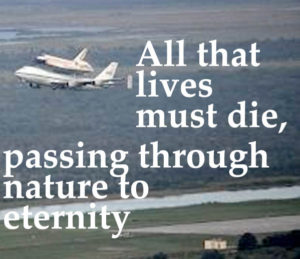 “Thou know’st ‘tis common – all that lives must die,
“Thou know’st ‘tis common – all that lives must die,
Passing through nature to eternity.”
(Hamlet, act 1.2)
Comments. Appropriate lines to accompany the end of the Space Shuttle Era, with the spectacular return of the Shuttle Endeavour to Los Angeles – while the B-747 that carried it made passes on some classic American icons or symbols, the Golden Gate and Hollywood.
Endeavour made its first flight in 1992, six years after the Challenger disaster. It flew on the next-to-last shuttle mission in May and June 2011. During its missions, Endeavour logged 299 days in space and circled Earth 4,671 times. Its total off-the-planet mileage: 122.8 million miles (about 1.5 the distance between the earth and the sun). Endeavour was named after the first ship commanded by Captain James Cook, the 18th century British explorer, navigator and astronomer. On HMS Endeavour’s maiden voyage in August 1768, Cook sailed to the South Pacific to observe and record the infrequent event of the planet Venus passing between the Earth and the sun. Determining the transit of Venus enabled early astronomers to find the distance of the sun from the Earth, which then could be used as a unit of measurement in calculating the parameters of the universe.
Tips for Use. Perfect lines to conclude philosophically the end of a project, or an era, or of everything and everyone. Or a reply to someone who is complaining about change, “but before we did it differently …”
If you like this website why not subscribe (see last menu item to the right)? You will get automatically any new blog as well as any other information and novelty that will be forthcoming, including a system to effortlessly (yes) remember hundreds of Shakespearean quotes by heart while having fun in the process. You can also chat with me – please go to the chat-page. And I promise, no sales calls, trade leads, venomous schemes, hidden plots, Machiavellian conspiracies, commercial ploys, psychological tricks, leads exchanges, barter proposals, suggestions or offers of any kind imaginable (and unimaginable)
In the play. Hamlet continues to mourn the death of the king his father and the Queen tries to make him see the matter rationally, that is, the temporality of everything.
